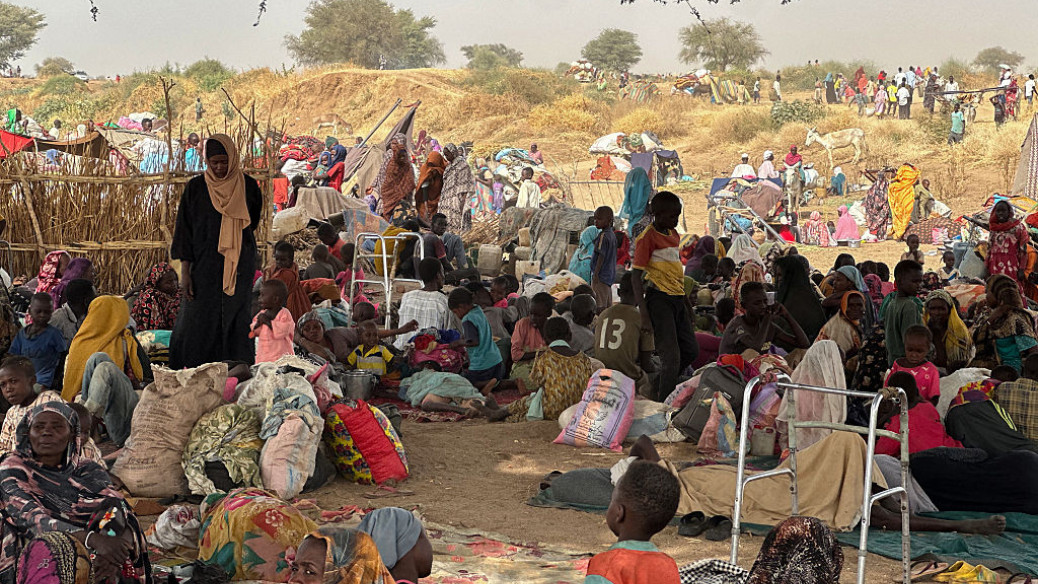Tawila has seen a dramatic influx of internally displaced persons following the storming of the Zamzam refugee camp by the RSF.
The town of Tawila in North Darfur has become a major refuge for displaced people following the mass exodus from Zamzam refugee camp in April, creating what Doctors Without Borders (MSF) has described as a “desperate” humanitarian situation.
MSF told The New Arab that approximately 500,000 people were now sheltering in and around Tawila. Services in the town have been rapidly scaled up to cope with the influx.
Kaylene Tomkins, MSF’s medical team leader in Tawila, said residents are enduring severe acute malnutrition and dehydration in 40-degree heat, often without proper shelter. With the rainy season approaching, conditions are expected to worsen due to the lack of waterproof materials.
Hygiene is poor due to shortages of soap, clean water, and latrines. Medical services are overwhelmed, and a measles outbreak has compounded the crisis, particularly dangerous for malnourished children. Supplies such as mosquito nets and essential medicines are also in short supply.
“Zamzam camp already had a high malnutrition rate, and we’re slowly gathering data to better understand the current situation in Tawila,” Tomkins said.
RSF attack on Zamzam
The displacement to Tawila followed a brutal attack by the Rapid Support Forces (RSF) on both Zamzam camp, located south of the contested city of El-Fashir, and Abu Shouk camp to the north. El-Fashir is the last major government-controlled city in Darfur and has remained a focal point of conflict since Sudan’s civil war began in April 2023.
According to the UN, around 400 civilians were killed during the RSF assault on the camps, including 11 aid workers in Zamzam alone. Roughly 400,000 people were displaced from Zamzam, with many fleeing to Tawila.
MSF told The New Arab that many of those who fled were suffering psychological trauma from gender-based violence, as well as emotional and physical injuries from the attack and the journey.
“Many people lost family members along the way, either from El-Fashir or Zamzam to Tawila. There are many accounts of children dying from dehydration en route. It’s a pretty dire situation,” Tomkins said.
MSF shared testimonies with The New Arab detailing the looting and burning of homes, the killing of men, the rape of women, and the kidnapping and assault of girls on the road to Tawila.
People have sought refuge in Tawila due to its relative safety compared to besieged El-Fashir and the now-militarised Zamzam camp. That security has allowed MSF and local partners to expand their operations.
“As soon as the emergency happened, MSF immediately scaled up activities,” Tomkins said, noting that the presence of an MSF hospital in Tawila made it possible to respond quickly to the crisis.
MSF is also supporting local NGOs in allocating space for new arrivals and is establishing health posts throughout the town. A new measles vaccination campaign is also being planned.
“We’ve scaled up quite significantly and brought in an emergency response team to support the effort,” she said.
No ceasefire, limited access
The UN is also supporting the humanitarian response in Tawila. UN Deputy Humanitarian Coordinator Antoine Gerard told The New Arab that NGOs and local authorities have designated agricultural land for the displaced and set up clinics, food, and water distributions.
However, Gerard acknowledged serious gaps in funding and capacity.
“Some of those NGOs weren’t funded at the level they should be. We’ve been calling on donors to commit more funds for this crisis,” he said.
“Darfur is just one of several areas where we need to be active – alongside Kordofan, Jazeera, and Khartoum – so capacity is really stretched.”
While Sudan’s war has recently tilted in favour of the Sudanese army, which retook Khartoum in March after nearly two years of fighting, El-Fashir remains under siege. On Monday, the Sudanese government accused the RSF of shelling the city, killing seven people and wounding at least 15.
Gerard said his team had tried to enter El-Fashir during a recent visit to Tawila but were denied access. UNICEF trucks loaded with food and medical supplies have been stranded outside the city for over four weeks, unable to reach an estimated 1 to 1.5 million people trapped inside.
“We approached different belligerents to secure a ceasefire… but we haven’t been successful so far,” he said. “We continue our efforts, but for now, access has not been granted.”

